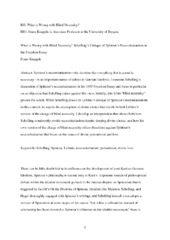| dc.contributor.author | Knappik, Franz Ulrich | |
| dc.date.accessioned | 2020-04-06T09:44:46Z | |
| dc.date.available | 2020-04-06T09:44:46Z | |
| dc.date.issued | 2019 | |
| dc.Published | Knappik FU. What is Wrong with Blind Necessity? Schelling’s Critique of Spinoza’s Necessitarianism in the Freedom Essay. Journal of the history of philosophy. 2019;57(1):129-157 | eng |
| dc.identifier.issn | 0022-5053 | |
| dc.identifier.issn | 1538-4586 | |
| dc.identifier.uri | https://hdl.handle.net/1956/21700 | |
| dc.description.abstract | Spinoza’s necessitarianism—the doctrine that everything that is actual is necessary—is an important matter of debate in German Idealism. I examine Schelling’s discussion of Spinoza’s necessitarianism in his 1809 Freedom Essay and focus in particular on an objection that Schelling raises against this view, namely, that it has “blind necessity” govern the world. While Schelling draws on Leibniz’s critique of Spinoza’s necessitarianism in this context, he rejects the assumption of divine choice that stands behind Leibniz’s version of the charge of blind necessity. I develop an interpretation that shows both how Schelling consistently avoids necessitarianism despite denying divine choice, and how his own version of the charge of blind necessity offers objections against Spinoza’s necessitarianism that focus on the issues of divine personhood and love. | en_US |
| dc.language.iso | eng | eng |
| dc.publisher | Johns Hopkins University Press | eng |
| dc.title | What is Wrong with Blind Necessity? Schelling’s Critique of Spinoza’s Necessitarianism in the Freedom Essay | eng |
| dc.type | Peer reviewed | |
| dc.type | Journal article | |
| dc.date.updated | 2020-01-22T21:34:35Z | |
| dc.description.version | acceptedVersion | |
| dc.rights.holder | Copyright 2019 Johns Hopkins University Press | eng |
| dc.identifier.doi | https://doi.org/10.1353/hph.2019.0005 | |
| dc.identifier.cristin | 1673954 | |
| dc.source.journal | Journal of the history of philosophy | |
